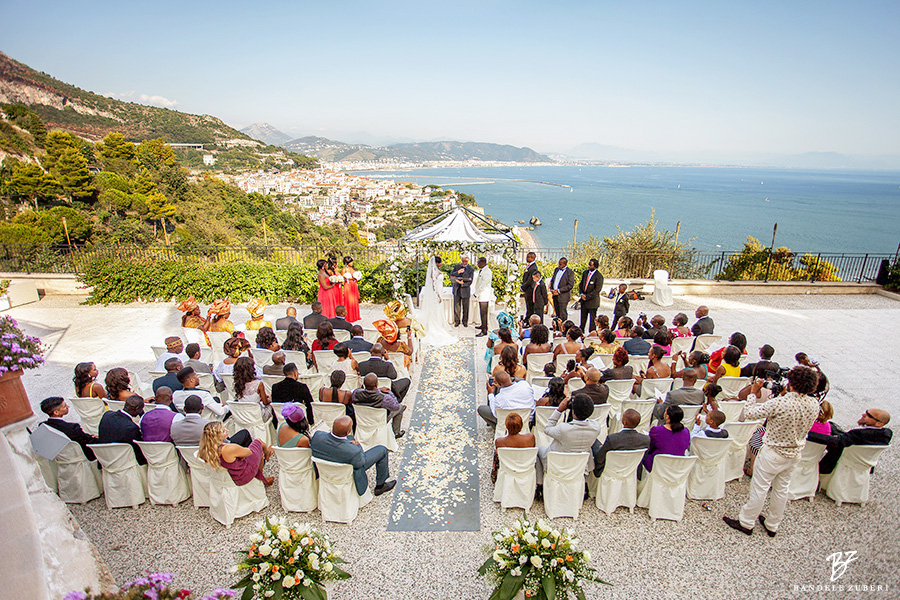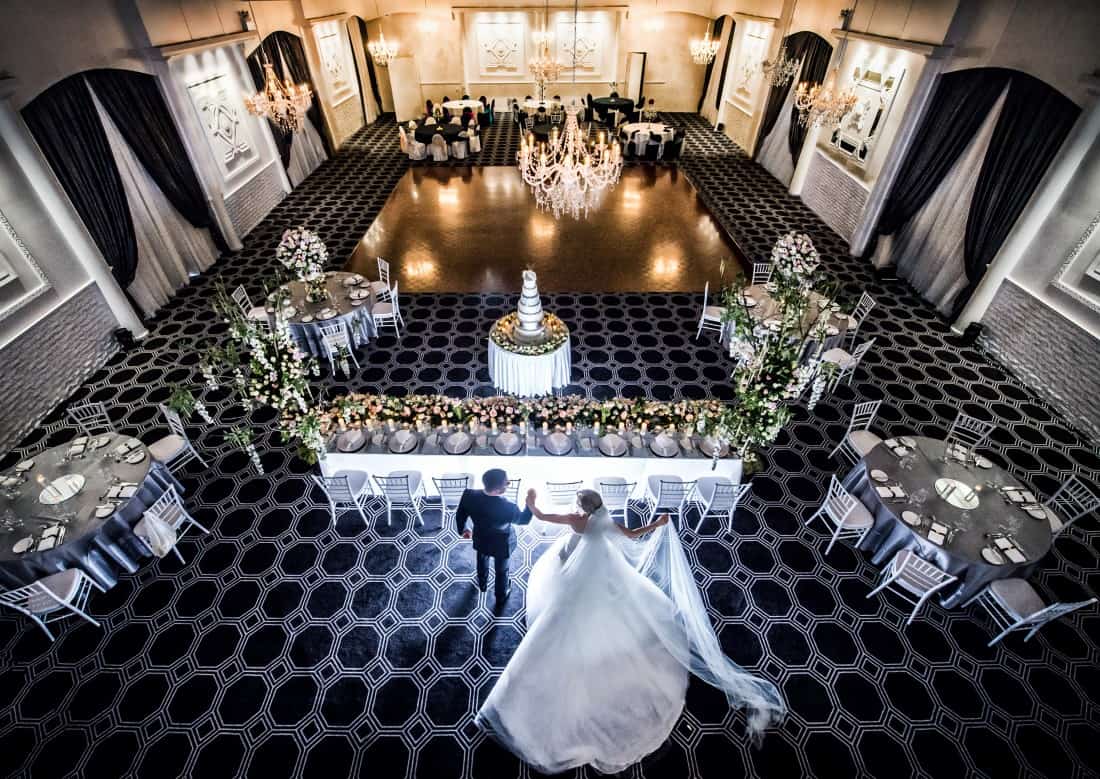Arranging a wedding at a destination may be an exciting journey. Couples can exchange vows in a unique and breathtaking location. However, it also comes with its own set of challenges that require careful consideration and meticulous planning.
From picking the ideal location to overseeing the logistics of travel and accommodations, a destination wedding demands a well-organised approach to ensure everything runs smoothly. Understanding the key elements in planning such an event can help couples avoid common pitfalls and make their dream wedding a reality.
Starting early is one of the most important tips for planning a destination wedding. The extra time allows for thorough research on potential locations, understanding local marriage requirements, and securing preferred vendors with limited availability. It provides ample opportunity to communicate with guests, ensuring they have the necessary information to make travel arrangements and plan their stay.
Another crucial aspect is to consider the guest experience; selecting a location that is both beautiful and accessible can significantly enhance the overall enjoyment of the event for everyone involved. By focusing on these essential factors and remaining flexible, couples can create a destination wedding that is as stress-free as it is unforgettable.
Summary
Planning a destination wedding is an exciting but complex process that requires thorough preparation. Key tips include starting early to research locations, understanding legal requirements, and securing vendors. Hiring an experienced wedding planner can reduce stress and ensure smooth coordination. Consider guest experience by choosing an accessible, beautiful venue and providing clear communication through a wedding website and regular updates.
Budget wisely by accounting for local taxes and booking early to lock in prices. Site visits are crucial for making informed decisions, and planning for weather contingencies is important. Enhancing guest experience with welcome gifts, extended celebrations, and personalised touches adds to the event’s success. Post-wedding, take time to relax and reflect on the memorable experience. Overall, a successful destination wedding hinges on early preparation, clear communication, and flexibility.
Find A Planner To Help You With Your Destination Wedding
- Professional Guidance: Hiring a wedding planner with experience in destination weddings is crucial. They bring local knowledge and expertise, ensuring the event is managed flawlessly.
- Stress Reduction: With so many elements to consider, from legal requirements to vendor coordination, a planner can significantly reduce the stress involved in planning a wedding from a distance.
Make Fall And Winter Venue Reservations
- Off-Peak Advantages: Consider booking your wedding during the fall or winter months. Wedding venues are less busy during these seasons, often leading to better availability and lower prices.
- Venue Response Times: Be prepared for slower response times from venues and vendors during the holiday season. Some businesses may even close for a break, so it’s important to start planning early.
Be Sure To Think About The Kind Of Ceremony You’re Having
- Legal vs. Symbolic Ceremonies: Decide whether you want a legal or symbolic ceremony early. Legal ceremonies abroad may require additional paperwork and can incur extra costs.
- Venue Authorisation: Not all venues are authorised to host legally binding civil ceremonies, so it’s essential to confirm this when selecting your location.
Financial Planning And Budgeting For A Destination Wedding
Know The Taxes In Your Area Before You Go
- Local Tax Considerations: Research the local taxes in your chosen destination to avoid unexpected costs. For example, Italy has a regionally variable tax on musical performances.
- Accommodation Taxes: Many destinations impose a nightly per-person tax at hotels. While these fees may seem small, they can add up, impacting your overall budget.
Think Through Your Financial Plan
- Lock in Current Prices: By planning and booking early, you can secure next year’s wedding at the current year’s prices. This strategy can protect you from price increases and give you more room to negotiate with vendors.
- Budget Flexibility: A clear financial plan allows you to be flexible and adjust as needed. This is especially important when dealing with fluctuating costs in foreign currencies.
Site Visits And Choosing A Venue For A Destination Wedding
Preparing For A Site Visit
- Importance of Visiting the Venue: If possible, visit your chosen venue before making a final decision. A site visit lets you experience the space, ensuring it meets your expectations.
- Meeting Vendors: While on-site, take the opportunity to meet with potential vendors and sample catering options. This can help you make more informed decisions and reduce stress closer to the big day.
Be Forward-Thinking During Off-Season Visits
- Creative Planning: If you’re visiting the venue during the off-season, remember that the appearance may differ during peak wedding season. However, this can be an opportunity to visualise how you want your event’s space transformed.
- Seasonal Considerations: Off-season weddings can still be stunning, but it’s essential to plan for different weather conditions and how they may impact the overall aesthetic of your wedding.
Legal And Logistical Considerations
Understand The Legal Requirements
- Documentation: Ensure that all legal documentation is completed well in advance. Different countries have varying requirements, so it’s crucial to understand what’s needed for a legally binding ceremony.
- Legal Advisor: Consider hiring a legal advisor familiar with the destination’s marriage laws. They can guide you through difficulties and guarantee your marriage is legally recognised in your home country.
Logistical Planning
- Travel Arrangements: Coordinate travel arrangements not only for yourselves but also for your guests. Providing information on accommodation, transportation, and local attractions can help make their experience smooth and enjoyable.
- Shipping and Transport: If you’re bringing items from home, such as decorations or attire, plan the logistics of shipping or transporting these items well in advance.
Communication With Guests
Keep Guests Informed
- Wedding Website: Create a website to inform guests of all details, from travel information to the wedding day itinerary. This ensures everyone is on the same page and reduces the number of questions you must field.
- Regular Updates: Send out regular updates to your guests as the wedding day approaches. This can include reminders about booking accommodations, any changes in the schedule, or tips for travelling to the destination.
Consider Guest Comfort
- Travel Assistance: Offer assistance with travel arrangements, such as group rates for flights or accommodation. A list of recommended hotels, transport options, and local attractions can be very helpful.
- Welcome Gifts: Consider preparing welcome bags for your guests, filled with local goodies, maps, and essential information about the destination. This benefits visitors and gives a personal touch. Feel more at home.
Weather And Contingency Planning
Plan For The Weather
- Weather Conditions: Research the typical weather for your wedding destination during the planned dates. You’ll be better prepared for any obstacles by doing this. Whether extreme heat, rain, or wind.
- Contingency Plans: Have a backup plan for outdoor ceremonies and receptions. This could be a marquee, an indoor alternative, or even a change in the event schedule if needed.
Handling Emergencies
- Make a list of the local emergency contacts. contacts, including medical facilities, your country’s embassy, and local law enforcement. Share this information with your wedding planner and close family members.
- Guest Health: Consider the health needs of your guests, particularly if your destination is in a remote location. Having basic medical supplies on hand and knowing where the nearest medical facilities are can be crucial.
Creating An Event, Not Just A Wedding
Take Into Account The Past.
- Extend the Celebration: Since your guests are likely travelling for several days or more, consider extending your wedding into a multi-day event. This can include a welcome dinner, a wine tasting, or a post-wedding brunch.
- Guest Experience: These additional activities make your wedding more memorable for guests, showing appreciation for their efforts and expenses in attending your destination wedding.
Have Fun With It!
- Enjoy the Process: Planning a wedding should be a once-in-a-lifetime experience. Amidst the planning, take moments to relax and enjoy the process.
- Balancing Work and Play: Incorporate fun into your planning sessions. Whether celebrating small milestones with a glass of wine or taking breaks to enjoy your destination, keeping the process enjoyable is key.
Post-Wedding Considerations
Post-Wedding Relaxation
- Honeymoon Transition: If you’re staying in the same location for your honeymoon, plan a few days of relaxation after the wedding. This gives you time to unwind and enjoy your new status as a married couple.
- Thank You Notes: Start preparing thank-you notes to send out as soon as possible after the wedding. This shows appreciation for your guests’ time and effort in attending your destination wedding.
Reflect On The Experience
- Celebrate Success: Take time to reflect on the success of your wedding day. Whether it went perfectly or had a few hiccups, it’s important to celebrate the journey and the memories you’ve created.
- Share Your Story: Consider sharing your destination wedding experience with others, whether through a blog, social media, or by contributing to wedding planning websites. Your insights could help other couples plan their destination weddings.
Conclusion
Planning a destination wedding is an adventure filled with excitement, challenges, and countless memorable moments. Following these tips ensures your wedding day is as stress-free and enjoyable as possible. From understanding the legalities and financial implications to creating a memorable experience for your guests, each aspect requires careful consideration and planning.
The key to a successful destination wedding lies in early preparation, clear communication, and a flexible approach to any challenges. Enjoy every moment of this unique journey, and your wedding day will be a lovely celebration of your love, surrounded by those who matter most.
FAQs About Wedding Destination
Which Details Should Be Included On A Wedding Invitation When The Destination Is Far Away?
Details on the location, the wedding site, your accommodations, your planned transportation (carpooling, shuttles, etc.), and any excursions or activities for the group should be included.
How Long Should The Honeymoon Follow The Wedding?
A destination wedding is usually a multi-day rather than a single-day ceremony and reception. That’s plenty of time to tie the knot and spend quality time with your guests.
Who Often Attends A Wedding That Takes Place At An Exotic Location?
There are a lot of cousins out there, from first cousins to distant cousins. According to common practice, if one uncle is invited, all uncles are invited, and so on. This may not be a big deal if you have a tiny family, but if you have a big family, this may make up the bulk of your guest list.
How Do People Get To Destination Weddings?
Generally speaking, weddings held at exotic locations like honeymoon spots cost less than those held in the bride’s hometown. The couple will cover the cost of their wedding package or custom design at the resort, but their guests will be responsible for covering their travel and lodging expenses. Weddings can be as extravagant or modest as the couple want.
How Many People Typically Travel To A Wedding’s Location?
This is because many guests at a destination wedding cannot afford the travel and lodging costs of attending. Couples who choose a destination wedding typically invite only 86 guests because of these costs.



